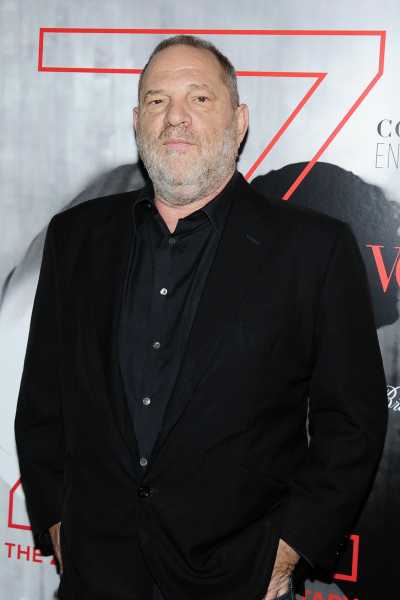
Administering erectile dysfunction shots. Returning women’s clothing left behind after sexual encounters. Blocking out calendar space for sex.
These are just some of the duties Weinstein Company employees — most of them women — were expected to perform for Harvey Weinstein, according to a lawsuit filed in February by New York Attorney General Eric Schneiderman.
The Weinstein Company had been slated for sale in mid-February to a group of investors led by Maria Contreras-Sweet, who ran the Small Business Administration under President Obama, and including billionaire and longtime Weinstein associate Ron Burkle, according to Brooks Barnes and William Neuman of the New York Times. But Schneiderman’s office was concerned about the terms of the sale.
“Any sale of The Weinstein Company must ensure that victims will be compensated, employees will be protected going forward, and that neither perpetrators nor enablers will be unjustly enriched,” the attorney general said in a press release.
On March 1, the investors’ group reached a new deal that satisfied the attorney general’s concerns. On March 6, however, the group announced it was pulling out of the agreement. Sources familiar with the deal told Vox that in doing its due diligence, the investors’ group found that the Weinstein Company had millions of dollars in undisclosed liabilities.
The lawsuit is ongoing, according to the attorney general’s office. The suit’s 38 pages contain numerous reports of employees being expected to help Weinstein engage in sexual misconduct, and managers and executives looking the other way. Those who have come forward to report harassment and assault by Weinstein have long said the misconduct didn’t happen in a vacuum but was facilitated by veritable armies of enablers.
Schneiderman’s suit underscores their accounts, painting a picture of a company-wide problem that hasn’t necessarily been adequately addressed by Weinstein’s ouster in October after multiple women came forward with allegations of sexual harassment and misconduct. The suit asserts that Weinstein’s actions were enabled by a number of employees, from assistants all the way up to the executive level. It offers yet another reminder that workplace sexual harassment is often a systemic problem requiring systemic solutions, and that getting rid of individual perpetrators isn’t always enough.
According to the suit, Weinstein didn’t act alone
The result of a four-month investigation, the lawsuit builds on reports in the New York Times, the New Yorker, and elsewhere alleging that Weinstein Company employees knew about and sometimes helped facilitate sexual misconduct by their boss. The following are just some of the allegations in the suit, which uses the abbreviations HW for Harvey Weinstein and TWC for the Weinstein Company:
- The Weinstein Company allegedly had a group of female employees, known by some as Weinstein’s “roster” or “wing women,” whose “primary responsibility included taking HW to parties at which he could meet young women, and introducing him to young women seeking opportunities at TWC with whom he could attempt to engage in sexual relations.” At one point, one of these women flew from London to New York to “to teach HW’s assistants how to dress and smell more attractive to HW,” the suit alleges.
- Another group of employees, Weinstein’s assistants (also predominantly female), had to perform duties like making sure Weinstein had plenty of erectile dysfunction shots in his travel bag, “maintaining space on his calendar for sexual activity,” and preparing and cleaning up a room at the company’s offices for Weinstein’s sexual encounters, including returning items of women’s clothing that were left behind. One former employee was actually asked to give Weinstein the shots, according to the suit.
- A third group, composed of female executives, were allegedly required “to meet with prospective sexual conquests in order to facilitate HW’s sexual activity, and to follow through on HW’s promise of employment opportunities to women who met with HW’s favor.” According to the suit, “the practice of sending female TWC executives to meetings with HW’s prospective sexual conquests was overt within the company. HW’s assistants were aware that HW would want a female executive to be present at the outset of any such meeting with a prospective sexual conquest, and were trained to ask HW which executives HW would want to have present at the meetings.”
The suit also alleges that senior executives at the company, including Weinstein’s brother and co-founder Bob Weinstein and David Glasser, the chief operating officer (referred to in the suit only by his title), knew about misconduct by Weinstein but did not take adequate action to protect employees.
- In 2014 and 2015, according to the suit, Bob Weinstein was informed of “claims of repeated and persistent sexual harassment and misconduct, but he took no measures to further investigate the claims of misconduct, to terminate HW’s employment, to restrict or prohibit HW from supervising women or having or seeking sexual contact with TWC employees or women seeking to do business with TWC, or from HW having private meetings with employees or women seeking opportunities in hotel rooms or TWC office space.”
- Part of Glasser’s job as COO was to handle harassment complaints passed up the chain of command by the human resources director, according to the suit. None of these complaints ever resulted in a formal investigation or any restrictions on Weinstein’s behavior, the suit alleges, though in 2015, Glasser and other executives did notify a member of the company’s board that they were concerned about numerous reports of misconduct by Weinstein.
The entire suit underscores a claim made in much of the reporting on Weinstein: He didn’t act alone. Instead, he allegedly deputized numerous female subordinates to arrange his sexual encounters for him, to put women at ease so they would be more vulnerable to his advances, and to make offers of professional benefits in exchange for sex. He was also allegedly supported by senior executives who fielded complaints about his behavior without taking sufficient action to stop it.
In the recent public conversation around #MeToo, sexual harassment has often been cast as an individual problem, one of isolated misdeeds committed by bad men. But Schneiderman’s suit depicts, instead, a company full of employees tasked with enabling or covering up misconduct. According to the suit, Weinstein made clear to some employees that they would face retaliation if they failed to play their roles. Other employees, especially senior executives and board members, may have played along for fear that rocking the boat would destroy a lucrative company — according to the suit, the company board’s failure investigate or sanction Weinstein was partly “due to concerns that HW’s removal, or even exposure of his misconduct, would risk harming the financial interests of company ownership.”
Whatever the case, Schneiderman’s suit presents a powerful argument that sexual misconduct at the Weinstein Company was a collective endeavor, and that simply removing Harvey Weinstein from the equation may not entirely fix the damage.
The suit sets a standard for companies looking to reform
Part of Schneiderman’s goal with the suit was to warn potential investors and the public that the terms of the Contreras-Sweet sale deal put forth in February could hurt Weinstein Company employees and survivors who have reported abuse by Weinstein. The attorney general’s office outlined several specific concerns. First of all, under the Contreras-Sweet deal, Bob Weinstein would leave the company but Glasser would remain. In the suit, Schneiderman argues that the sale could thus fail to protect employees “who would be reporting to some of the same managers (including TWC’s Chief Operating Officer (‘COO’)) who failed to investigate HW’s ongoing misconduct.”
Schneiderman’s office was also concerned that the Contreras-Sweet deal didn’t include adequate compensation for victims. The would-be buyers stated publicly that the deal would include multimillion-dollar settlement fund to compensate survivors, according to the Times. However, Schneiderman said in a February press conference that the terms of the deal did not include a standalone victims’ fund, and that victims’ compensation would instead come out of insurance payouts, which would also need to cover legal fees and other expenses. The attorney general’s office was concerned there might not be sufficient money left over for survivors.
There was ongoing disagreement over the issue of the victims’ fund. A source familiar with the February deal told Vox that it did include a dedicated fund of $50 million set aside for victims. But Amy Spitalnick, press secretary for Schneiderman’s office, told Vox that in the deal the office reviewed, “there was no dedicated victims compensation fund of any amount, nor did the proposed deal release victims from the insidious non-
On March 1, the investors’ group announced that it had reached a new agreement to buy the Weinstein Company. The new agreement was negotiated in a meeting at Schneiderman’s office, and included a dedicated victims’ compensation fund of $80-$90 million, said a source familiar with the deal. David Glasser would no longer be involved in company leadership.
The investors’ group has always aimed “to build a movie studio led by a board of directors made up of a majority of independent women, save about 150 jobs, protect the small businesses who are owed money and create a victims’ compensation fund that would supplement existing insurance coverage for those who have been harmed,” Contreras-Sweet said in a statement to media. The new deal, she added, would help protect the jobs of the remaining Weinstein Company employees. Without a deal, it was unclear what would happen to them, as Anita Busch and Mike Fleming Jr. pointed out at Deadline.
“We are pleased to have received express commitments from the parties that the new company will create a real, well-funded victims compensation fund, implement HR policies that will protect all employees, and will not unjustly reward bad actors,” Schneiderman said in a statement to media on March 1. “We will work with the parties in the weeks ahead to ensure that the parties honor and memorialize these commitments prior to closing.”
But on March 6, Maria Contreras-Sweet announced in a statement to media that while doing due diligence on the deal, the investors’ group had “received disappointing information about the viability of completing this transaction,” and, as a result, had decided to pull out of the deal.
According to a source familiar with the deal, the investors had discovered that during the negotiation process, the Weinstein Company had failed to disclose more than $50 million in liabilities — meaning the decision to terminate the deal was a financial one, and had nothing to do with the issues raised in the lawsuit.
It is likely that the Weinstein Company will now have to file for bankruptcy. Contreras-Sweet said in her statement that the investors might consider buying some of the company’s assets as part of bankruptcy proceedings, with the goal of using them to create a film studio led by women.
Meanwhile, Spitalnick told Vox that the lawsuit against the Weinstein Company, as well as the investigation by the attorney general’s office, are ongoing.
The suit and Schneiderman’s announcement in February set a kind of standard for companies looking to come back from sexual harassment allegations: They must make real restitution to survivors, ensure that employees are safe, and keep perpetrators from profiting from misdeeds. The suit set forward publicly and in the voice of a state official what reform should look like, and it made one thing clear: The removal of one man doesn’t turn a toxic environment into a safe one.
Update: This story has been updated to include additional comments about the presence of a victims’ compensation fund in the proposed February deal, and with details from ongoing negotiations.
Sourse: vox.com






